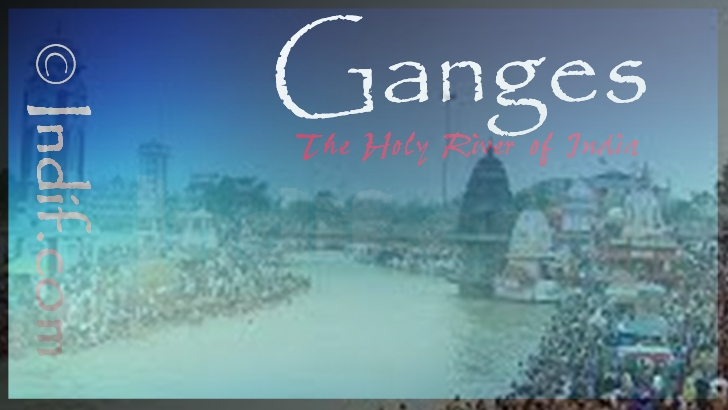The Ganges or Ganga river is lifeline of the most sacred river of Hindu India. The River Ganga is a trans-boundary river of India and Bangladesh. Ganga is the longest river of India flowing through mountains, valleys and plains. The 2,525 km (1,569 mi) river rises in the western Himalayas in the Indian state of Uttarakhand, and flows south and east through the Gangetic Plain of North India into Bangladesh, where it merges into the Bay of Bengal.
It originates as the Bhagirathi River from the Gangotri Glacier which lies at altitude in the Uttaranchal Himalaya Mountains to the north of India and it joins the Alaknanda River near the town of Deoprayag to form the Ganga. Origin of Ganges River indicates its religious significance. This river has its origin from a place famously named Gangotri. Several Hindu pilgrimage places are located on various locations of the country from where it passes and locations on the banks of Ganges River. Believers of Hindu religion worship this river religiously. City of Varansi located on the banks of this river remains most notable holy city for believers of Hinduism.
The Ganga is revered by Hindus as the most sacred river on earth. In Hindu belief the Ganges is associated with the Goddess Ganga and, according to the myth, the sage Bhargava underwent extreme austerities to bring the divine Ganga down to the earth in order to cleanse the impurities of his ancestors. Delighted by his devotion Goddess Ganga came rushing down with such immense force that her crashing waters threatned to cause devastation of the earth. But the god Shiva, cushioned her fall in his matted hairs and knotting it until the flow subsided. People believe that Ganga resides on top of Shiva's head as his second wife, the first being Parvati.
Hindus regard the Ganges as not only a river but also a mother, a goddess, a tradition, a culture and much more. In Hinduism it is considered holy to take a pilgrimage to the Ganges and take a dip. Hindus consider the waters of the Ganges to be both pure and purifying. Nothing reclaims order from disorder more than the waters of the Ganges. Many Hindus believe that bathing in the Ganga can purify a person's soul of all past sins, some believe that it can also cure the illness. So, many Hindu families keep Ganga water in their homes as they consider it to be very pure.
Besides being a sacred river, Ganga is also worshiped as a deity in Hinduism and respectfully referred to as 'Gangaji' or 'Ganga Maiya' (Mother Ganga).
Festival of Ganga : Ganga Dussehra
The first ten days of the month Jyeshtha, known as Dashahara, are dedicated to honour the river Ganges. It is believed that if one offers prayers on this day, one attains salvation from ten sins. The festival's name Dussehra is derived from 'Dus' which connotes ten and ' hara' which means defeat. Thus the name Ganga Dusshera... Learn more about this festival.
National River of India : River Ganga is officially declared the National River of India.
The Ganga, especially, is the river of India, beloved of her
people, round which are intertwined her memories, her hopes
and fears, her songs of triumph, her victories and her
defeats. She has been a symbol of India's age-long culture
and civilization, ever changing, ever flowing, and yet ever
the same Ganga
- Pandit Jawahar Lal NehruIf Ganga lives, India lives. If Ganga dies, India dies.
-Dr. Vandana Shivaji (renowned environmentalist and GAP member)The Mississipi, the Ganges, and the Nile…the Rocky Mountains, the Himalaya, and Mountains of the Moon, have a kind of personal importance in the annals of the world.
― Henry David ThoreauThe sacred river Ganges in India is one of the most enduring images of the country.
-Daniel LakGita and Ganga constitute the essence of Hinduism; one its theory and the other its practice.
-Swami VivekanandaThe Ganga to me is the symbol of India’s memorable past which has been flowing into the present and continues to flow towards the ocean of the future.
-Pandit Jawahar Lal Nehru









